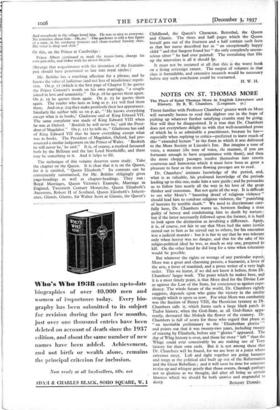NOTES ON ST. THOMAS MORE
THOSE familiar with Professor Chambers' greater work on More will naturally hasten to read this slighter one in the hope of picking up whatever further satisfying crumbs may be going. Nor will they be disappointed. It is true that Dr. Chambers does not everywhere delight us with that well-nourished prose of which he is so admirable a practitioner, because he has— especially when replying to critics—preferred to leave much of this " extended lecture " in the form in which it _was delivered to the More Society at Lincoln's Inn. But imagine a tone of voice, a manner (the tone of voice, the manner, if you are fortunate enough to have acquaintance with them), and then the more choppy passages resolve themselves into retorts courteous and humorous which it must have been as great a pleasure to hear as the more flowing passages are to read.
Dr. Chambers' intimate knowledge of the period, and, what is as valuable, his profound knowledge of the periods leading up to this one, make him a sure guide; and he persuades us to follow him nearly all the way in his love of the great thinker and statesman. But not quite all the way. It is difficult to see why More's " haunting dread of religious violence" should lead him to condone religious violence, the " punishing of heresies by terrible death." We need to discriminate care- fully here, Dr. Chambers warns us; between finding a man guilty of heresy and condemning. him to death by. torture:: but if the latter necessarily followed upon the former, it is harcl to look upon the distinction as involving a difference. Again, it is, of course, not fair to say that More had the same justice meted out to him as he served out to others, for his execution was a judicial murder : but it is fair to say that he was tolerant only when heresy was no danger, and that for the sake of his religio-political ideal he was, as much as any one, prepared to kill. On the other hand he did long for a time when toleration would be possible. •
But whatever the rights or wrongs of any particular aspeot, More was a great and charming person, a humanist, a lover of the arts, a lover of mankind, and a prose writer of a very high order. This we learnt, if we did not know it before, from Dr. Chambers' larger work. The point which he makes here, and it is a most timely point, is that More died for the Divine Laiv as against the Law of the State, for conscience as against expe- diency. The whole future of the world, Dr. Chambers rightly suggests, depends upon who gains the victory in the similar struggle which is upon us now. For what More was combating was the fascism of Henry VIII, the Henrician tyranny as Dr. Chambers calls it, which forms such a large black patch in Tudor history, when the God-State, as. all. God-States appa- rently, devoured like Moloch the flower of the country. Dr. Chambers is full of scorn for those who regard that phase as " an inevitable preliminary to the Elizabethan glories ' and points out that it was twenty-two years, including twenty of nursing by Elizabeth, before any " glories " appeared. The day of Whig history is over, and those far more " left " than the Whigs could ever conceivably be are making use of' Tory history for their own ends, But it is not among these that Dr. Chambers will be found, for we are here at a point where extremes meet: Left and right together are going hammer and tongs at the political idol built up out of the Reformation and the Great Rebellion ; and it will soon be time for someone to rise up and whisper gently that those-events; though perhaps not so glorious as we thought, did after all bring us certain liberties which' We should be both unwise and ungrateful to decry.
BONAMY DOBREE•


























































 Previous page
Previous page